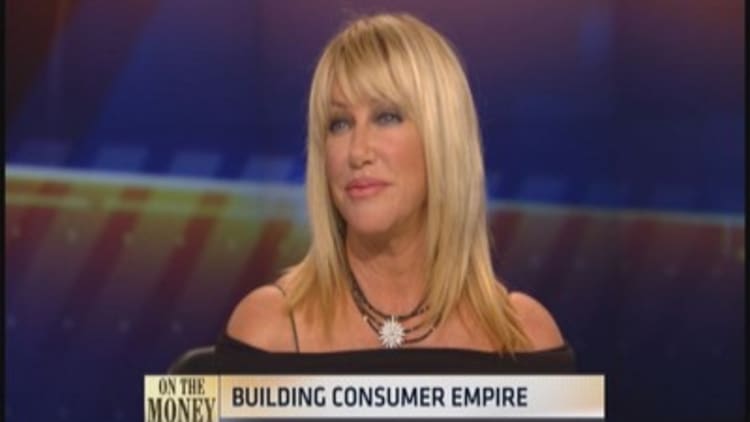A funny thing happened to baby boomers on the way to retirement: Many realized they couldn't afford, or didn't want, to retire.
Whether it's for financial reasons or a chance to try something new, more baby boomers are embarking on an encore career—a second professional act that can bring in not only money but often the fulfillment that may have been lacking the first time around the career bend.
In a survey of people age 44 to 70, just under 10 percent were in encore careers in 2011, and another 31 percent wanted to join them, according to nonprofit organization Encore.org and the MetLife Foundation.
But another survey, by Merrill Lynch and Age Wave, reported that more than 70 percent of people 50 and older plan to work during the years that in the past we might have called retirement.
Read MorePicked a retirement spot? Not so fast!
"You're going to see a lot more encore careers based on financial necessity and the fact that people are living longer," said financial advisor Jeremy Drake of Heller Capital Resources.
In addition, Drake pointed out that encore careers, especially those that involve a start-up, now have a low barrier to entry, thanks to the Internet.
With just a few clicks and a small payment, it's possible to become incorporated, register a business and file a patent. "It makes innovation very accessible," Drake added.
Laura Walton of Tucson, Arizona, is living proof. Five years ago she left a job selling print advertisements and embarked on something entirely different.
Drawing on an earlier experience of bankruptcy and conversations with her husband, David Hamra, who is a financial planner, Walton became convinced that ordinary people needed help with their money-management skills. And she felt that her personal story of losing it all and then rebuilding put her in a good position to guide others struggling to make good money decisions.
Read MoreGetting ready as retirement looms
"At some point, I realized that I wanted to do something more than sell print ads the rest of my life," said Walton, who is 61.
She added that her feeling grew as the print media industry contracted. "I wanted to help other people do what I had done for myself," she said.
In 2009, Walton became an accredited financial counselor. Last year she was asked to become the executive director of a private foundation, TCI Financial Advisors, whose goal is to do just that.
Finding a new career path means that Walton's retirement plans will be delayed. She's not yet burned out on her encore career, and she'd like to give it time to ripen.
"Many of my friends are in the same position; we've left the work we did for years, but we aren't ready to quit working," Walton said.

Try 'incore' instead
Encore careers may be fun to imagine, but people must temper fantasy with a dose of reality, argued Nancy L. Anderson, certified financial planner and vice president at Key Private Bank.
Anderson urges her clients to consider their current job in its entirety. After many years with one company, people are often grandfathered into generous benefits that may no longer be available to new employees, such as dollar-for-dollar company matches on 401(k) plan contributions, four to six weeks of vacation a year and retiree medical coverage.
Those certainly aren't perks to walk away from without serious consideration, she explained.
Read MoreSplitting after 50 rocks retirement
"When you look at the benefits package for someone who's been in their job for 25 years, that's going to be really hard to replace," she said.
Instead of leaving, Anderson suggested clients look inside their current company for new opportunities. "Maybe you're working in HR now but might want to switch over to the philanthropy" arm of your company, she said.
"You can get that greater meaning without leaving the company," Anderson added. "Think of it as an 'incore' career."
Or use your built-up vacation time to explore meaningful volunteer work, something that will reenergize you when you return to your cubicle.
Stroke of bad luck
Of course, not all so-called encore careers are voluntary; many follow on the heels of a job loss.
The Great Recession was particularly cruel to older workers. Though they were less likely to have lost their jobs, workers 50 and older were also 20 percent less likely to find new employment, according to think tank Urban Institute.
"Maybe some of these folks could continue in their careers, but because of disruption, it got them thinking about something different," noted certified financial planner Kimberly Foss, founder and president of Empyrion Wealth Management.
Read MoreBetter get retirement-ready today
One of Foss' clients was laid off from student-loan originator Sallie Mae at the age of 52. A job in student loans probably wasn't in the cards again, she decided, so she started a student-loan consulting business, working with college-bound students and their parents to secure loans.
But the new venture took some planning. Foss was adamant that the client not burn through any retirement savings while her business was taking off. Withdrawing retirement assets prior to age 59½ incurs penalties plus ordinary income taxes.
If you're an administrative assistant who was making $75,000, it's because you were in the same place for so long, and you're not going to be able to find another job like that.Charles Conradsenior financial planner with Szarka Financial
So Foss used the client's other assets to create a 24-month income reserve. Not only did it give her cash flow, it also gave her peace of mind that she could afford to pay her bills until her business turned a profit.
Things don't always work out as fortuitously for others. Some people may not be able to find jobs that pay as well as the jobs that were lost, and their new jobs may not be particularly fulfilling.
Read MoreBoomers seek elder-care advice
"If you're an administrative assistant who was making $75,000, it's because you were in the same place for so long, and you're not going to be able to find another job like that," said Charles Conrad, senior financial planner with Szarka Financial.
It's a hard pill for many to swallow.
"I kind of have to tell them that they won't get that salary again," Conrad said. "The only way to make the math work is to adjust their lifestyle."
—By Ilana Polyak, special to CNBC.com




